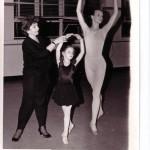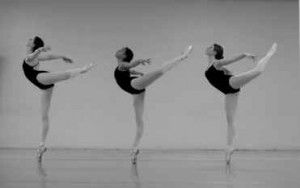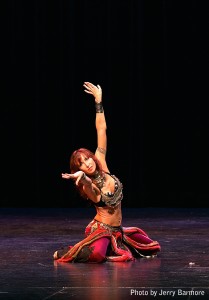Auditions for Ballet Arkansas, the only professional dance company in the state will be held on March 14, 2010 at 2:00 p.m. at Shuffles & Ballet II, 1521 Merrill Drive, Little Rock, Arkansas 72221. Dancers must be at least 18 years old with advanced ballet technique and performing experience; female dancers must dance on pointe. Other dance techniques and skills, such as partnering, jazz, modern, tumbling and hip-hop, will be considered during the selection process but at not required. A resume, references and dance pictures must be submitted at the audition. 36 week contract.
Teaching Tip: About Practicing At Home
 I have beginning students ask me what they can practice at home to improve their dancing. My usual answer is…nothing. As a new student (especially in ballet), doing steps at home can actually be a bad thing. If the student doesn’t understand technique, they can begin to develop bad habits which can be very hard to break.
I have beginning students ask me what they can practice at home to improve their dancing. My usual answer is…nothing. As a new student (especially in ballet), doing steps at home can actually be a bad thing. If the student doesn’t understand technique, they can begin to develop bad habits which can be very hard to break.
This view may seem extreme, but I have found it is a good one to advocate. When students have some knowledge of technique it is fine to give suggestions for practice, but with a rank beginner it is better that they come to class and learn how to do the movements right first. Understand the theory behind things a bit before they try to do it on their own. In my opinion it would be better for them to double up and take two classes if they want to get more practice.
It’s something to think about if you are a new teacher, or if you have never taught beginning students. Be ready with an answer–you are sure to be asked.
Dance In The US: Dance Conservatory
This week Dance in the US features Delaware…
 Name: Dance Conservatory
Name: Dance Conservatory
Location: 522 Otis Drive in Tudor Industrial Park, Dover, DE, 19903
About: The Dance Conservatory is the official school of the Ballet Theatre of Dover, and it has been around for a quarter of a century. The pre-professional program has placed dancers in prestigious companies such as Los Angeles Ballet Theatre, Suzanne Farrell Ballet, Dutch National Ballet and Pennsylvania Ballet.
The Director of the school is Teresa Emmons, a Julliard School graduate with a diverse background in both teaching and performing. In addition to the regular class offerings, the Dance Conservatory also offers an intensive summer training program for intermediate, advanced and pre-professional students.
Finding Your “Voice” In Belly Dance
I have been in the belly dance community as an instructor and performer for several years, and I have had the pleasure of studying and performing with people who have been in this art form for decades. What drew me to stay in belly dance was a sense of sensuality, and a bit of sisterhood, especially since I started with learning American Tribal, as this form is generally done with a group of two or more. It’s a great energy to dance with a group!

Now, I realize that when ATS or Tribal in general was first brought into the light, some people who had been dancing classical Egyptian/Oriental had issues with it; it’s not pure Oriental, etc. Even so, little by little, Tribal was being accepted. It embraces the old with the new.
Belly dance is the one true form of dance that does embrace every body type – which is wonderful! We all share one common denominator: the love of dance. We are a sisterhood, a community. But are these words overused and spoken with emptiness? As a community of sisters, we should encourage each other and our students to continue their studies. This means taking not only additional belly dancing, but ballet or other styles–with various instructors. For our students, (and for us as well), these additional classes can assist in finding one’s own voice in dance.
There is nothing greater for me as an instructor than to see a student who has taken fusion, ATS, Egyptian, etc. to step out and perform, because they’ve taken a pinch from X, a handful from Y, a little bit of Z and mixed in their own personality – and now we see them really dance! We see a glimpse inside their soul.
Who are we to put limitations on our students and tell them they can’t take from other instructors? Don’t we as instructors seek to improve our quality of dance? Wouldn’t it be hypocritical for us to stop our students from furthering their knowledge? And shouldn’t we encourage/support their performance opportunities? Nothing would be more satisfying to me then to see a student of mine surpass me; grow past me. That truly would be the highest compliment I could receive.
Teaching Tip: Dealing With Difficult Dance Students
 If you have taught dance for a while, chances are good that you have run across a difficult student or two in your time. If you are new, you may be caught a bit off-guard by some of the things that can happen in the classroom.
If you have taught dance for a while, chances are good that you have run across a difficult student or two in your time. If you are new, you may be caught a bit off-guard by some of the things that can happen in the classroom.
Having some strategies in place to deal with things such as outbursts, resistance to certain exercises or too much talking is key. Some tricks you learn as you go, but there are also resources out there that can help you anticipate these issues and be ready with a response. Here are a few good ones that you can draw from:
+ If you have a “bully” in your class, check out Dance Advantage’s post on that topic and stop things before they get out of hand.
+ This sheet isn’t designed specifically for dance class, but it has good tips on how to cope with behaviors like shyness, complaining and talking in class.
+ Having rules and reminding students of what those rules are can help cut down on bad classroom behavior. The rules will vary based on the age of the students, as well as the philosopy of the teacher, but it is a good idea to have some in place.
- « Previous Page
- 1
- …
- 225
- 226
- 227
- 228
- 229
- …
- 260
- Next Page »





